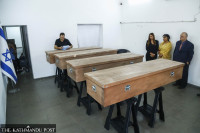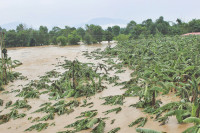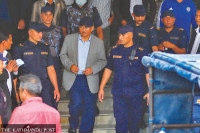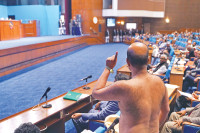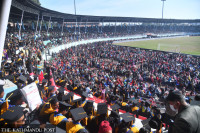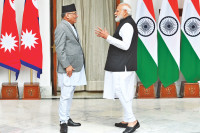Politics
Yearender 2022: More rough weather ahead
The political parties did not develop a common minimum programme to tackle the growing problems of the country, and the coming days could be more difficult for the people.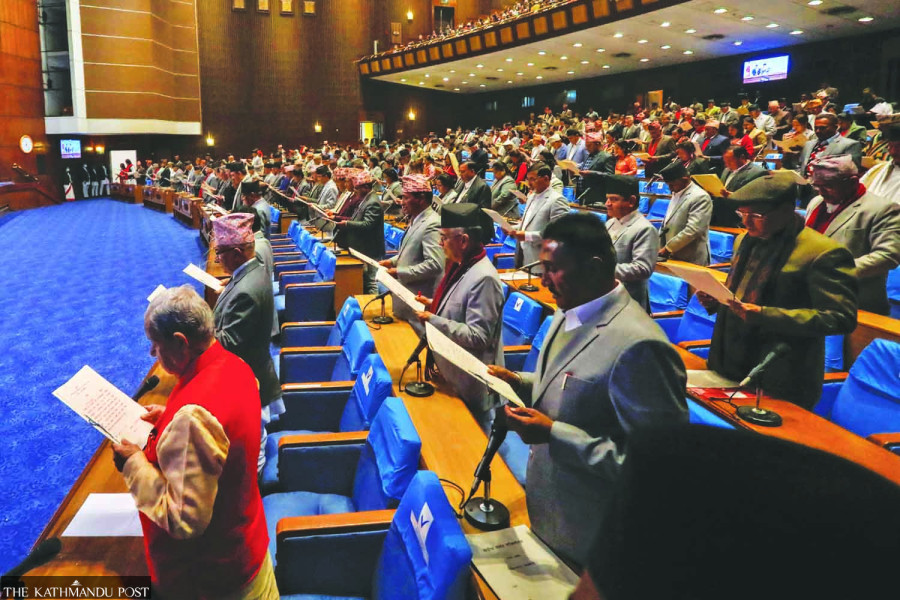
Tika R Pradhan
The year 2022 was characterised by problems on many fronts. Nepal suffered an economic recession immediately after the disastrous Covid pandemic. Then there was a burst of inflation that made life harder for everybody. Amid these situations, Nepal held two elections—the local elections in May and the parliamentary and Provincial Assembly elections in November. People came and voted, but in very low numbers; and the country saw the lowest voter turnout in decades of 61 percent. No party was able to garner a majority, an early indication that the country is expected to experience another period of unstable politics.
No one knows for how long, but the people will definitely suffer. The split in the Nepal Communist Party, which had an almost two-thirds majority in the federal Parliament and six of the seven provinces, set off a series of destabilising events in 2021, making for a tumultuous year with changes in government across the country.
The year 2022 was more peaceful as it had been declared an election year. But the road ahead is patchy. The much anticipated political stability seems to be a far cry for the country with the November 20 federal and provincial polls not awarding a majority to any one party. The electoral alliance of the Nepali Congress, CPN (Maoist Centre), CPN (Unified Socialist) and Rastriya Janamorcha did not ensure a majority either. The alliance fell six seats short of a majority (138 seats) in the 275-seat House of Representatives.
“Though this year remained somewhat stable with two major polls held successfully, it seems that the upcoming years could be politically unstable,” said Jhalak Subedi, a political analyst. “I think stability will depend on how effectively our political leaders handle the country’s politics.”
On December 25, there was a twist in the tale. The coalition broke up and Pushpa Kamal Dahal of the Maoist Centre was appointed the 44th prime minister of Nepal. The power game is on.
The year also saw Baburam Bhattarai sever ties with the Janata Samajbadi Party and form his own party, the Nepal Samajbadi Party, which joined hands with the Maoist Centre chair Dahal. Bhattarai left his constituency Gorkha-2 for his former comrade Dahal and ensured Kathmandu-7 for his daughter Manushi Yami Bhattarai. Bhattarai’s Nepal Samajbadi Party contested the polls with the Maoist Centre's election symbol.
There was an attempt to form a Socialist Centre consisting of the Maoist Centre, Madhav Kumar Nepal-led CPN (Unified Socialist), Bhattarai-led Nepal Samajbadi Party and Bamdev Gautam besides the Janata Samajbadi Party, but the plan fell through after Upendra Yadav and some other parties refused to join. Maoist Centre chair Dahal has been working hard to form the Socialist Centre with the Unified Socialist and the Nepal Samajbadi Party even if other parties refuse to enlist.
The Rastriya Swatantra Party (RSP) emerged out of the blue as the fourth largest party with 20 seats in the House of Representatives. But tellingly, it didn’t contest the provincial polls.
In the local level polls, a few independent candidates won in several major cities, including Balen Shah in Kathmandu Metropolitan City and Harka Sampang in Dharan Municipality, to the great surprise of the established political parties.
The pro-monarchy Rastriya Prajatantra Party (RPP), which held only one seat in the previous House of Representatives, won 14 seats this year–half of which were garnered through the Proportional Representation system. According to some observers, the sudden emergence of the RSP fits in with the objective of the RPP, which is to return to a Hindu kingdom, but this has not been independently verified.
Political economist Hari Roka believes that the political parties should have developed a common minimum programme to tackle the growing problems of the country; but that did not happen, and the coming days could be more difficult for the people. “Neither the Congress-led alliance nor the one led by the CPN-UML came out with a common minimum programme to deal with the problems our country is facing, due to which no party could garner a majority,” said Roka. “With this structure of Parliament, we cannot expect political stability.”
Given the rise of new forces and the resurgence of pro-monarchy forces like the RPP, there is also a chance that they might question the existing federal democratic republic. “With the country bracing for political instability in the days to come, I think there could also be a threat to our existing political system,” Roka told the Post.
Most of the major political parties, including the Nepali Congress, the CPN-UML and the CPN (Maoist Centre), returned the same old people to the party leadership during their national conventions held in the previous year. The parties were rejuvenated, even though the top leaders retained their seats. The issue of handing over the helm to the new generation was raised during the conventions, and this became a hot topic when the parties were selecting their candidates for the polls.
Frustrated by the domination of the top leaders in their seventies, people cast their ballots for new forces, new faces and younger leaders. The abrupt rise of the RSP can be taken as an example of the people’s warning to the existing political parties to stop playing power games. The election of younger leaders like Gagan Thapa and Bishwo Prakash Sharma as the twin general secretaries of the Nepali Congress has encouraged youth leaders of other parties to challenge their leadership. The election of the Congress contemporaries Thapa, Sharma and Pradip Poudel in the November 20 polls has given rise to a ‘troika’ again in the oldest party–Nepali Congress.
The year gone past was also remarkable in the sense that vibrant regional political forces like the Janata Samajbadi Party and the Loktantrik Samajbadi Party saw their strength slashed, and they are no longer leading forces even in Madhesh. In their place, new forces like the Janamat Party led by CK Raut, who had previously shunned mainstream politics with a secessionist agenda, and the Nagarik Unmukti Party have risen in the western Tarai.
The Congress-led coalition government continued to make unconstitutional moves. In July, the Sher Bahadur Deuba administration registered a bill to amend the Constitutional Council Act in the National Assembly, but it did not move forward following vehement criticism. There was a kind of a tussle between the government and the President’s Office after President Bidya Devi Bhandari refused to endorse the Citizenship Amendment Bill.
On February 13, an impeachment motion was registered in the Parliament Secretariat against Chief Justice Cholendra Shumsher Rana. The case has been abandoned halfway. That's a sign that politics is likely to be topsy-turvy in 2023 too.




 10.12°C Kathmandu
10.12°C Kathmandu
